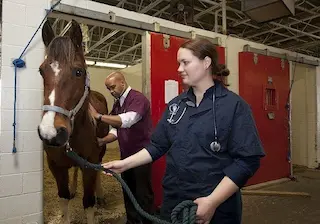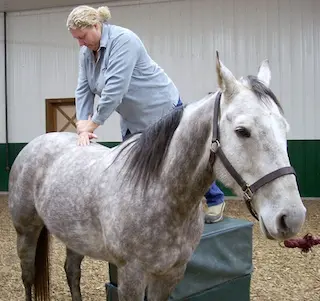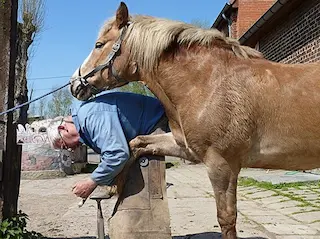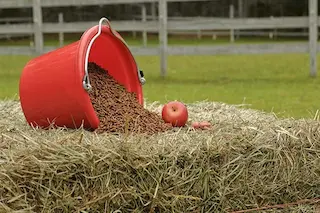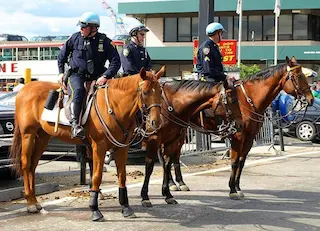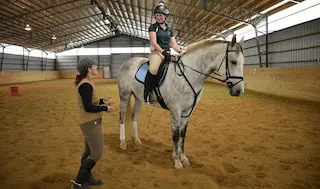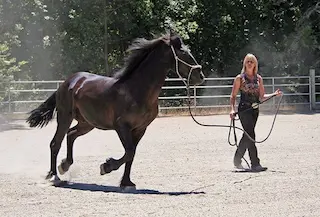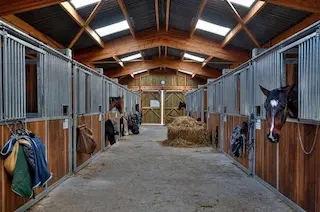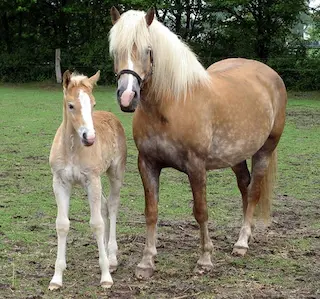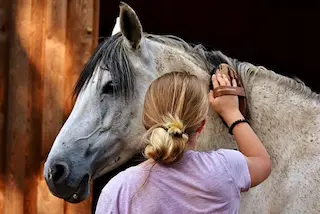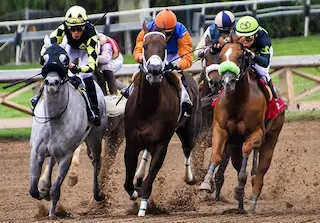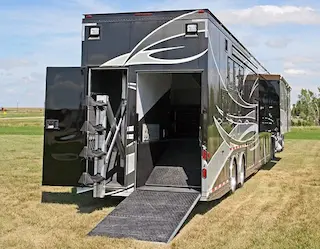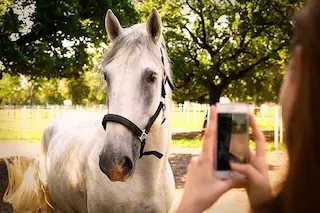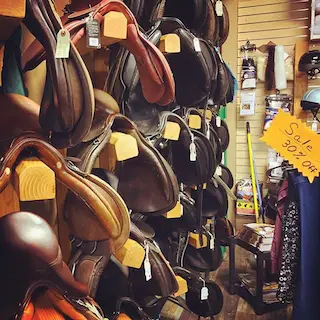There can be no better thing than doing a job you really enjoy and if you love horses then what better job to do than one where you can work with them? These days there’s a multitude of different occupations where you can either work with them, directly or indirectly. Whatever your interest is there’s bound to be a job out there for you, whether it’s an equine veterinarian, a mounted police officer or an equine photographer.
Not sure what sort of job would suit you, don’t worry I’ve put together a list of the most popular jobs out there, along with some alternatives you might not have thought about.
Equine veterinarian
As you might expect an equine veterinarian is a veterinarian that has chosen to specialize in horses. You would be expected to treat injuries and illnesses as well as carry out routine services such as vaccinations and pre-purchase checks. There’s a lot of training involved in becoming a specialist equine veterinarian but if you want to help horses it can certainly be rewarding.
Do I need special qualifications?
It can vary from country to country but as a rule, you’ll need to obtain a Bachelor’s Degree before you can study for a Veterinary Medicine Degree. Once you’ve got both of those you’ll be able to apply for a license to be able to practice.
What are the advantages?
Being a veterinarian isn’t for everybody but it can be an extremely rewarding job. While you’ll be carrying out routine procedures you’ll also play a major role in treating every possible ailment a horse could have.
What are the drawbacks?
Unlike us, horses don’t stick to a 9 to 5 routine so you could be working nights and weekends. If necessary it’s the veterinarian’s job to euthanize a horse, while this is only ever done if it’s in the horse’s best interests it can still be a difficult and upsetting job to do.
What are the alternatives?
If you like the idea of working with horses in a medical capacity but aren’t keen on becoming a full-on veterinarian then you could consider these jobs:
- Equine veterinarian technician – To become a veterinarian technician you’ll need to have successfully completed a two-year degree and will help assist the veterinarian in his daily work.
- Registered veterinarian nurse – As a veterinarian nurse, you’ll be expected to dress wounds, administer drugs, care for horses before, after and during any treatment as well as do some of the paperwork.
Want to specialize?
Once you’re a fully qualified equine veterinarian you can choose to focus in one particular area such as:
- Dentist – As an equine dentist you’ll be focusing on the horse’s teeth, be on the lookout for signs of disease or abnormal wear and float (This involves the horse’s teeth being filed or rasped to remove sharp edges) their teeth.
- Track veterinarian – Usually working at a racecourse it would be your duty to inspect all of the horses during their morning workout as well as before each race. You’ll also need to treat any injuries during the race as well as check the horses after. As a track veterinarian, it’s your duty to collect urine and blood samples for spot tests both pre and post-race.
Want to know more? Check out the American Association of Equine Practitioners’ website, they’re the world’s largest equine veterinary organization.
Equine physiotherapist
As an equine physiotherapist, you’ll be working with horses that either have movement problems are suffering from injuries. You’ll work with them to help reduce their pain, improve their movement and help them to recover.
Do I need special qualifications?
In most cases, you’ll need some sort of physiotherapy degree, whether it’s in veterinary physiotherapy or equine physiotherapy is up to you. Some organizations also run private training courses that allow you to train on the job.
What are the advantages?
If you’ve ever sprained an ankle, pulled a muscle or suffered from an injury that has limited your movement you know how much better you feel when you start to recover, now you’ve got an idea of how a horse might feel. Knowing you’re helping a horse like that can be so rewarding.
What are the drawbacks?
Some horses won’t be able to travel so you’ll most likely have to do a lot of traveling and, depending on where you live, you may have to spend a great deal of time in the cold.
What are the alternatives?
If you like the idea of this job but don’t want to be a physiotherapist then why not think about one of these jobs:
- Massage therapist – Especially popular in the sports arena your job would be to warm a horse’s muscles up while also relieving any tension he may have.
- Equine hydrotherapist – Still in its infancy as a career option you’ll be doing a similar job as a physiotherapist but will use water as your method of treatment, whether as an equine spa, water treadmill or just helping the horse to swim.
Want to know more? Check out the Association of Chartered Physiotherapists in Animal Therapy website.
Farrier
A farrier is one of the most important equine jobs out there and goes way beyond just trimming and fitting shoes, you’ll not only be helping to keep the horse’s hooves healthy but you’ll be helping him to move freely too.
Do I need special qualifications?
In most countries, there are no certifications but instead, you’ll need to complete an apprenticeship with a registered and approved farrier.
What are the advantages?
If you like working with different horses and really making a difference to their life then this could is the job for you. You’ll also be able to help ‘correct’ some confirmation issues.
What are the drawbacks?
You’ll spend a great deal of time standing while bent over and lifting the horse’s legs which can be back-breaking work at times. You’ll also need to be fit and strong as it can be a physically demanding job.
Want to know more? Check out the American Farriers Association’s website.
Equine nutritionist
The role of an equine nutritionist is to create a feed and supplement plan for a horse based on the horse’s body condition, physical ability, and their workload. You’ll also need to troubleshoot diets that are no longer working and then work out an alternative.
Do I need special qualifications?
You’ll need to have at least a Bachelor’s Degree in a related field, such as animal science, veterinary studies, or nutrition. Some companies, however, will prefer somebody to have a postgraduate degree. You’ll also have to be good at math as you’ll be using this, along with statistics, to work out how much a particular horse should have each mealtime.
What are the advantages?
As an equine nutritionist, it can be very rewarding when your feed plan has made a real difference to a horse, whether it be his physical condition or performance.
What are the drawbacks?
The path to becoming a fully qualified equine nutritionist can be a long one, you’ll spend years studying as well as, more than likely, working your way up through other animal species before you can specialize in horses.
Want to know more? Check out the American College of Veterinary Nutrition’s website.
Mounted police officer
Often overlooked as a job being a mounted police officer is a great career option, not least because you’re often given your own horse. As a mounted officer you’ll be expected to keep crowds in order, patrol areas vehicles can’t get to and deal with the public as well as carry out regular police duties.
Do I need special qualifications?
There are no specific qualifications needed to be a mounted officer but you will need to spend a few years as a regular police officer before being able to transfer to a mounted division.
What are the advantages?
As well as being able to uphold the law, you’ll also help in search and rescue operations. Mounted officers are often seen as being more approachable than regular officers so you’ll get to visit schools and community groups too.
What are the drawbacks?
As a police officer, you’ll be expected to go into dangerous situations that most people would happily avoid, being on horseback you’ll stand out more than other officers so, in some situations, may be more of a target for abuse.
Want to know more? To find out more about becoming a mounted police officer contact your local force, you can find their details here.
Riding instructor
Be honest, I bet you’ve never thought about being a riding instructor as a career before? Yet I bet we’ve all met more instructors than we have any other horse-related occupation. You’ll get to meet and work with a very wide range of people from absolute beginners to seasoned professionals wanting to improve their skills.
Do I need special qualifications?
Some countries require you to be certified but in others, you can teach without any qualifications at all. That said though, if you’re teaching people at a competition level it can be helpful if you’re a certified riding instructor.
What are the advantages?
Being able to ride a horse is a wonderful thing and as a riding instructor, you get to help people learn that. You’ll get to ride lots of different horses too as you’ll sometimes have to demonstrate the correct way of doing something.
What are the drawbacks?
Evenings and weekends are often the only free time some people have so you’ll need to be free to teach people at times that are convenient for them.
Want to know more? Check out the Certified Horsemanship Association’s website, the website of the Association of British Riding Schools.
Horse trainer
As a trainer, you can choose to specialize in a particular discipline or work with all types of horses from those with particular needs to young horses that have never been backed before. In the job, you’ll not only deal with the training of the horse but in some cases the rider too, especially if the horse isn’t behaving correctly to what the rider is asking or if the rider is giving the horse mixed messages.
Do I need special qualifications?
You don’t need to take any exams or have a certificate to work as a trainer but experience will count for a lot. This is one reason why people often work with an experienced trainer before deciding to work for themselves.
What are the advantages?
Correct training can be so important to the happiness and welfare of a horse, after all, if he doesn’t know what he’s doing wrong then he will understandably become unhappy. As a trainer, you’ll prevent this from happening, therefore resulting in a much happier horse.
What are the drawbacks?
While some trainers will work at a riding center or specialized equestrian facility most are self-employed. This means that you’ll be in charge of finding horses to train yourself, as you become more experienced and build a name for yourself this will get easier but it can be tough when you first start out.
Want to know more? Check out the Parelli natural horse training program.
Barn/Yard manager
As a barn or yard manager, you’ll be looking after everything that is involved with the day-to-day running of the stables, this will include not only the welfare of the horses but also the maintenance of all of the buildings and pasture. You will also be in charge of the other employees.
Do I need special qualifications?
There are no physical qualifications that you have to pass in order to be a barn or yard manager but you’ll need to have experience in all areas of horsemanship, including basic medical knowledge.
What are the advantages?
You won’t spend all of your time working with horses but you’ll be in charge of every horse in the yard and, depending on the type of yard, this may include exercising them. You’ll also build a close working relationship with lots of different horses.
What are the drawbacks?
As the manager, you’ll be the person that will have to deal with any problems and issues that arise, a lot of your work (things such as paying bills, dealing with suppliers, etc) won’t involve working with the horses either.
Want to specialize?
You can become a manager at a general yard but if you want to be a bit more specialized then you might want to consider one of these options:
- Boarding stable manager – If you choose to specialize as a boarding stable manager then you’ll also have to liaise with the horse owners to make sure that all of the horse’s needs are met.
- Riding stable manager – Some riding stables require their managers to be able to give lessons as well but as a riding stables manager, you’ll have the same duties as a general stable manager but will also be expected to organize lessons too.
- Discipline-specific manager – If you have a particular interest in a discipline or breed then you can want to manage a yard that deals solely with this. If you choose to do this then some areas, such as racing, may require you to be certified.
Want to know more? Check out the Certified Horsemanship Association’s website.
Breeder
You can either work for an already established breeder or if you’d prefer, set up your own business breeding horses. As you would expect you’ll be dealing with all aspects of breeding and selling horses whether it be a particular breed, discipline or just breeding in general.
Do I need special qualifications?
There’s no prerequisite for qualifications but some disciplines or breed registries may require you to be assessed before they’ll add you to their list of reputable breeders. If you do choose to specialize then it’s better to check with the breed’s registry or discipline’s association first. Some countries will also require you to have some sort of animal science or equine reproduction certification.
What are the advantages?
As a breeder, you can help to ensure that a foal gets a good start in life. If you specialize in a particular breed then it can be very rewarding to help strengthen that breed and increase its numbers.
What are the drawbacks?
Unless you’re breeding Thoroughbreds you’ll probably have to learn other breeding ‘techniques’ such as artificial insemination as well as embryo transfer. Due to the rules set by the Jockey Club, Thoroughbreds are only allowed to be bred via live cover (this is where the stallion and mare meet and are bred naturally).
What are the alternatives?
If you don’t want to be a breeder but would still like to work in the breeding industry then there are alternatives:
- Broodmare manager – In most cases, you’ll have to have a lot of experience within the industry to become a broodmare manager, but in the job, you’ll be looking after the needs of both the mare and her foal.
- Stallion manager – As you might expect the role of a stallion manager is the opposite of that of the broodmare manager. You will also deal with the stallions breeding schedule, sperm collection and everything else involved in the process such as paperwork.
- Bloodstock agent – If you want to work with Thoroughbreds then you might want to consider becoming a bloodstock agent. As an agent, your job would involve buying and selling for a commission.
- Equine pedigree analyst – Rather than being directly involved in the breeding process you’ll be advising clients of the possible outcome of breeding specific stallions with certain mares. A breeder may want to focus on a particular characteristic so you would need to have a good understanding of genetics.
Groom
The role of a groom is to care for a horse, or horses, on a daily basis, your tasks would involve everyday tasks such as mucking out stalls, feeding, grooming, cleaning tack, and anything else a horse may need on a day-to-day basis. Depending on your arrangement you may be required to either warm the horse up prior to them being ridden (and cool them down after) or exercise the horse yourself.
Do I need special qualifications?
There are no degrees or formal certificates available for grooms but you would have to demonstrate good horsemanship knowledge, whether it be via previous work experience or horse ownership. Some countries do, however, have informal certifications that act as a record of your knowledge.
What are the advantages?
The advantage of being a horse groom is that you’ll be looking after a horse (or multiple horses) as if you own them, but as an added bonus you’ll also get paid for the privilege! While not all do, a lot of employers will pay your housing and travel costs and even give you a stall to use for your own horse.
What are the drawbacks?
While you may have your expenses paid, the job itself isn’t always that well paid, often not a huge amount above the minimum wage, on top of that, you’ll be working very long days.
Jockey
You’d think that the role of a jockey is pretty self-explanatory but there’s more to it than you might think. As well as riding racehorses for owners you’ll also be in charge of maintaining all of the riding equipment, both your’s and the horse’s.
Do I need special qualifications?
You don’t need to have any qualifications to become a jockey but you will have to complete an apprenticeship to become a professional jockey. As well as serving an apprenticeship you will also have to meet certain physical requirements such as having good eyesight and being within a certain weight range, often between 100 and 150 pounds.
What are the advantages?
Yes, there is a lot of hard work involved in becoming a successful jockey but when you do you’re often able to compete in over a thousand races a year. As a successful jockey, you’re able to train apprentices yourself too. A large number of jockeys go on to become trainers too
What are the drawbacks?
There’s a lot of hard work involved in becoming a jockey, you’ll need to have a good level of fitness and be able to cope well with pressure. There are often height and weight requirements too and even if you meet all of those there’s still no guarantee you’ll be a successful jockey.
What are the alternatives?
Not everybody is able to become a jockey, you may be too tall or too heavy for example, but don’t worry there are still plenty of alternative jobs within the racing industry:
- Racehorse trainer – The job of a trainer goes beyond that of just training a horse, they’re also responsible for the daily care of the horse.
- Jockey agent – Most jockeys have an agent who works for the horse owners. It’s the job of an agent to find jockeys for their clients as well as negotiate the jockey’s fees.
- Exercise rider – As an exercise rider, it’ll be your job to make sure a horse is fit and ready for a race. You’ll also be responsible for riding the horse during daily workouts.
- Hot walker – You might not realize but after a race its the job of a hot walker to cool them down. This is usually done by leading them around or bathing them before then returning them to the stall.
- Racetrack outrider – Outriders will often use their own horse to make sure that everybody at a racetrack is safe, they are also responsible for opening the track and closing it at the end of the day.
I know that there are also jobs such as racing steward and racetrack starter but these both have minimal contact with horses so I decided not to include them.
Want to know more? Check out the Jockey Club (USA) or Jockey Club websites.
Equine transporter
Not everybody will want to invest in a trailer themselves and will instead choose to hire a company to transport their horse (or horses) for them which is where an equine transporter comes in. You’ll also be fully responsible for any and all necessary insurance.
Do I need special qualifications?
You don’t need any qualifications to become an equine transporter but if you’re intending to set up your own business you’ll need a valid driving license, permits and specialist insurance. Depending on the country and region you may also need to meet the requirements of, or register with, certain regulatory agencies.
What are the advantages?
If you enjoy traveling and love horses then this is the ideal job for you. You can choose to specialize in national or international travel and then you be paid to see the world!
What are the drawbacks?
You can choose to specialize in local, national or international transport but in most cases, there will be a lot of traveling. If you choose to establish your own business doing this then you’ll also have to deal with all of the paperwork, insurance, taxes and everything else that comes with running a business. If you decide to start your own business then you’ll also need to consider the cost of purchasing a trailer.
Equine insurance broker
Not everybody wants to spend the time calling different insurance companies to get quotes for their horse which is where the job of an equine insurance broker comes in. It would be your job to give them accurate quotes and details of different policies, you would also have to advise people on which policies may work best for their needs.
Do I need special qualifications?
This can vary from country to country but most do require you to have some form of college degree and license. You’ll also have to keep up to date with new laws, rules and regulations to make sure your knowledge is current.
What are the advantages?
Insurance can be a metaphoric minefield with so many different policies on offer but as a broker, you’ll be able to help people find the right policy and cover for them.
What are the drawbacks?
As you would expect for an insurance broker you don’t get much contact with horses, instead, as a new broker, you’ll spend most of your day in an office with occasional travel to clients. The amount of time spent with clients will normally increase as you spend longer in the job.
Equine photographer
The role of an equine photographer is a broad term that covers everything that involves a horse being in front of a camera. You can choose to specialize in a particular area such as photographing mares and their foals, stallions, competition horses or a specific breed. Whatever you choose, if you love horses and have a creative flare this is the perfect job for you.
Do I need special qualifications?
You don’t need to have any qualifications but you will need to have an eye for a good picture as well as understand how to edit photographs.
What are the advantages?
You can choose to focus on a particular breed or discipline but even if you’re not specializing you still get the opportunity to really indulge your passion for horses in a fun and creative way.
What are the drawbacks?
Most equine photographers do the job on a freelance basis so there’s no fixed income, sickness pay or paid annual leave. Some people choose to do this as a hobby until they have enough work and a good enough reputation to earn a full-time salary.
Tack shop owner
Okay, I admit this doesn’t normally mean you’re actually working with horses but it does definitely mean that you are working within the horse industry. While the internet has definitely changed things this has only helped broaden the scope of this job, instead of having to have a ‘bricks and mortar’ shop you can now have an online store.
Do I need special qualifications?
You don’t need to have any qualifications at all but you will need good business sense as well as the ability to organize stock and fulfill orders.
What are the advantages?
You get to find out the latest crazes long before anybody else does plus you also get to buy everything at wholesale or trade prices. If you like meeting people and talking horse then this is perfect for you, after all, how often have you gone into your local tack shop and NOT spoken to the people there about what your horse is doing, what event you’re going to or the latest piece of equipment you’ve heard about?
What are the drawbacks?
This initial cost can be pretty high because you’ll need to source stock. If you have a physical shop then you’ll also have to rent a premises and arrange insurance, if however, you choose to only sell online then you’ll either need to create a website yourself or pay a developer to build one for you. You could also opt for a mobile tack shop but this also has the added cost of a vehicle big enough to hold a full selection of stock.
Conclusion
So there you have it, the 15 best jobs that allow you to work with horses. If you feel that I’ve left something out please feel free to either let me know in the comments below or on social media.
I hope you found this article helpful. If you did I’d be grateful if you could share it please as it would really help me.
Recommended products
Over the years I have tried hundreds of different horsey products, from various blankets and halters to different treats. Some I’ve loved, others I’ve hated but I thought I’d share with you my top all-time favorite products, the ones I never leave the yard without. I’ve included links to the products (which are in no particular order) that I really think are great.
- Horse Knots by Reference Ready – If you’re like me and enjoy pocket reference guides then you’ll love this knot tying guide. These handy cards can easily fit in your pocket or attach to the saddle for quick reference. They’re waterproof, durable and are color coded to make them easy to follow.
- Mane ’n Tail Detangler – Even if you never show your horse you’ll need to detangle his tail from time to time (and possibly his mane too) which is always a challenging chore! I’ve found that if I run a little bit of detangler through my horse’s tails every few days it stops them from getting matted up and makes combing them easy, even if they’re coated in mud. I don’t know if I should admit to this or not but it also works wonders on my hair.
- TAKEKIT Pro clippers – Over the years I’ve tried a lot of different clippers and while some were obviously better than others I found these to be by far the best. They are heavier than a lot of other clippers but for me, that’s a good thing, it makes them feel more sturdy and hardwearing. On top of that they have a range of speeds so are just as good for clipping your horse’s back as they are his face. I also like the fact that they come in a handy carry case but that’s not for everybody. The company that makes them is super good and incredibly helpful too, a real bonus these days. The only thing I wasn’t keen on was the fact that it doesn’t come with any oil, but that’s not a major problem as it’s not difficult to buy lubricant.
- Shire’s ball feeder – There are so many boredom buster toys out there but I like to use these every day, regardless of whether or not my horses are bored. I find that it helps to encourage my horses to problem solve by rewarding them with treats (or pieces of fruit) but it also mimics their natural grazing behavior which helps to keep them calm and de-stressed.
- Horse safe mirror – This is a strange one that many people are surprised about but I like to put horse safe mirrors in the trailers as well as in the quarantine stalls. It helps to prevent the feeling of isolation by giving the impression of other horses being around. Being herd animals horses can get extremely stressed when they feel that they’re on their own but with these stick-on mirrors, they believe that at least one other horse is with them.
- Rectal thermometer – I know this isn’t glamourous at all but it’s vital for your horse’s well-being to be able to check their temperature and a rectal thermometer is the easiest way of doing this which is why I’ve added it to the list.
Shopping lists
I’ve also put together a few shopping lists of essential items that I’ve found helpful over the years. I’ve broken the lists down into different categories rather than put everything in one massive list 😉

